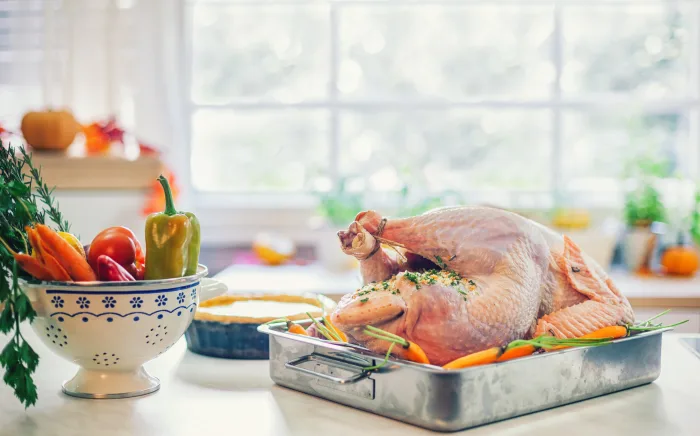One of the most debated questions when preparing Thanksgiving dinner is whether or not to rinse your turkey before cooking it. While some people insist on it, others strongly advise against it. The answer affects not only the flavor of the bird but also its safety, making it important to get expert opinions on the matter.
The Verdict: Rinsing Your Turkey is Not Recommended
The overwhelming consensus among top chefs is that rinsing your turkey is not a good idea. George Duran, a renowned chef and culinary correspondent, strongly advises against it. He explains that rinsing the turkey can spread harmful bacteria, like salmonella, around your kitchen. “Water splashing from the bird can contaminate nearby surfaces, utensils, and other foods,” Duran says. This makes rinsing more dangerous than beneficial.
Instead, many chefs prefer brining the turkey. Brian Landry, chef and co-owner of QED Hospitality, emphasizes that brining is a better option for adding moisture and flavor. “I recommend brining the turkey first, and after that, rinsing becomes unnecessary,” Landry says. A simple brine of salt, sugar, Worcestershire sauce, and water is all it takes to create a juicy turkey without the need for rinsing.
The Importance of Crispy Skin
Beyond the risk of bacteria, chefs are also concerned about the texture and quality of the turkey’s skin. Rinsing the turkey can prevent it from achieving a crispy skin when roasted. Josh Tomson, a well-known chef, advises, “Do not rinse your turkey before cooking. If you brine it first, rinse it lightly, then pat it dry with paper towels.” Patting the turkey dry is essential for achieving that coveted crispy skin. Chef “Fig” Figeuroa, a grilling expert, adds that for dry-brined turkeys, there is no need to rinse at all.
If You Do Choose to Rinse, Take Precautions
While most chefs recommend avoiding rinsing, some suggest that it may be necessary to remove preservatives found in store-bought turkeys. Jessie-Sierra Ross, cookbook author and culinary expert, explains that if you do choose to rinse, it’s important to do so with extreme caution. She advises clearing the area around the sink to prevent any cross-contamination and suggests thoroughly disinfecting all surfaces after handling the turkey. Ross also prefers wearing rubber gloves to further reduce the risk of spreading bacteria.
Wesly Jean Simon, an executive chef, also advises rinsing store-bought turkeys to remove preservatives and chemicals. “Rinse the turkey under cold water to remove excess toxins, and be sure to pat it dry afterward,” Simon advises. He emphasizes that rinsing, followed by drying, ensures a cleaner and better-tasting bird.
To sum it up, most culinary professionals agree that rinsing a turkey can do more harm than good by spreading bacteria. However, they recommend using a wet brine to season the turkey, which essentially “rinses” it by soaking the bird in flavorful liquid. If you do choose to rinse your turkey, take great care to avoid splashing and to clean your kitchen thoroughly afterward. Finally, pat your turkey dry to achieve a crispy, golden skin when roasting.


